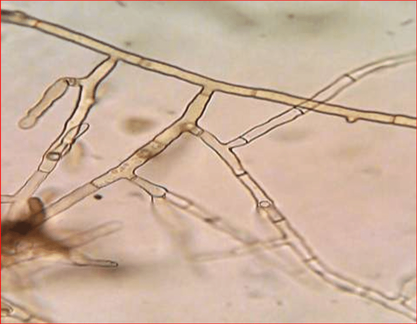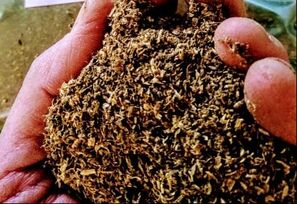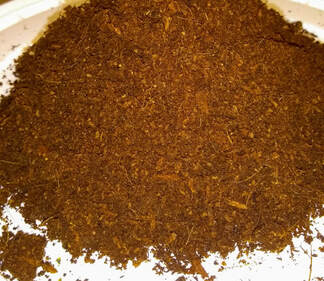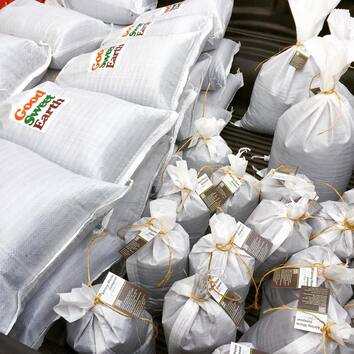 Rhizoctonia solani Rhizoctonia solani A recently-released study from an international group of scientists and researchers (link to PDF) shows that vermicompost (compost produced by worms) not only improves crop productivity, but actively fights fungal attacks that can destroy harvests. This is great news, not only for organic farmers, but also home gardeners who are looking to boost their harvest and prevent fungal outbreaks without using harmful synthetic fungicides and fertilizers. Their scientific conclusion: "The application of vermicomposting to agricultural land increases productivity by a multifaceted impact on soil health and crops, facilitating nutrient enrichment and preventing pathogen development. Vermicompost and its derivatives, such as vermiwash [liquid extract produced from earthworm-rich vermicompost], along with associated decomposer bacteria, act against fungal pathogens. The antifungal efficacy of vermicompost may be associated with bioactive compounds present in the CF [coelomic fluid], mucus, skin secretion of earthworms and metabolites secreted by decomposer bacteria. The CF of earthworms has an inherent ability to defend worms against diseases. It inhibits the growth of a variety of fungal pathogens, such as Rhizoctonia solani, Alternaria solani, Aspergillus niger, A. flavus, Fusarium oxysporum, and F. graminearum. The metabolites from vermicomposting bacteria, CF, mucus, and skin secretion synergistically combat phytopathogenic fungi. As an organic product, vermicompost and its derivatives are environmentally friendly. Thus, these products should be used to boost agricultural productivity by nutrient enrichment and reduction of plant fungal diseases." The layperson's summary: Worms which break down organic matter have to be able to fight off harmful bacterial and fungal pathogens in the soil, so they secrete fluids from their bodies to do this. These fluids are also present in the vermicompost (their poop) that we apply to the soil in our pots and gardens. Therefore the study shows that because of the composting worms' fluids present in the vermicompost, their vermicompost also acts as an antifungal agent for your plants. To order Living Worm Compost for your garden and potted plants, click here.
0 Comments
 Organic alfalfa meal Organic alfalfa meal The ideal time to prepare your garden beds for spring planting is in the fall. Yes, you read that right! Preparing your garden beds for next year starts as soon as the season ends. Start by cutting down this year’s crops. Dispose of diseased plants and compost healthy ones. Then, Alfalfa meal is a natural soil amendment that I add to my garden each year. Mix 5 pounds per 100 square feet of garden space before adding Living Worm Compost. Vermicompost is more nutrient dense than traditional compost and can fill the gaps of nutrients that may be missing in your soil. One bag per 100 square feet of garden space is a good place to start. Healthy soil in the fall means healthy plants that will produce good crops and help fight off disease in the spring. Many gardeners use raised beds instead of planting in ground. There are several benefits to raised beds such as being able to control the quality of the soil, its easier on the back, and some feel it’s more aesthetically pleasing. For me I have hard clay soil and while we could amend it that would have taken several seasons to get it where I wanted it and I was too eager to get my garden going when we moved to this property.
Remember that a raised bed is basically a container, and should be filled with a potting mix, as you would a container. To fill raised beds I recommend the rule of thirds. Mix a third of the following ingredients:
If your beds are tall you can fill the very bottoms with leaves, sticks, and cardboard to save money. You can reserve the top half of the beds for the compost and coconut coir as a money saving measure. Coconut Coir is something that's popped up in more and more organic gardening conversations in recent years. It's also a popular growing medium for hydroponic gardening. But what is it, and how can it help your garden grow? The folks at Epic Gardening have a fantastic write-up on coconut coir, from its origins to all of the great benefits of using it. First, we need to understand what coconut coir actually is.  So when it comes to adding coco coir to your garden soil, how much should you use? For starting pots and raised beds, we'd recommend a 1/3 - 1/3 - 1/3 mix of screened topsoil, compost and coco coir. Basically, equal parts of soil, compost (either vermicompost or traditional compost) and coir. This will give your soil a great foundation for holding moisture as well as nutrients, while remaining light enough for air and roots to move freely.  One of the services we're most proud of at Good Sweet Earth is our free delivery of products to any home in Kent, Ottawa, Allegan and Muskegon Counties. You order our Living Worm Compost, Worm Tea, Raw Biochar, Dutch White Clover Seed or Bold Tomato soil amendment, and we'll drop it off at your door free of charge! The reason we're able to do this is we piggy-back our deliveries with our lawn fertilization jobs. So in an effort to keep our prices low and reduce our environmental impact, we're introducing delivery days for every part of our service area. This way, if we're in Grandville spraying lawns, we'll do our deliveries the same day. If we're in Muskegon, we'll do our Muskegon County deliveries that day too. If you've ordered a Worm Tea CSA share, we'll do everything we can do deliver on the day you request, as long as we get 24-hours notice before the delivery date. Per-gallon purchases of Worm Tea will be delivered according to the schedule below. Below is our delivery schedule for May-October, 2019: Sunday: No deliveries Monday: Muskegon County, Ottawa County Tuesday: Allegan County, Southern Ottawa County (south of Lake Michigan Dr) Wednesday: Southeastern Ottawa County (East of 64th, South of Lake Michigan Dr), Southwestern Kent County (West of 131, south of 28th) Thursday: Kent County Friday: Northern and Eastern Kent County (North of 28th/Grand River, East of 131) Saturday: We make deliveries anywhere in our service area, but limited delivery spaces available, deliveries will be made on a first-come-first served basis. Check out our online store to shop! |
